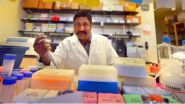(Press-News.org) Citizen science surveys compare well with traditional scientific methods when it comes to monitoring species biodiversity – according to new research from the University of East Anglia.
Research published today in the journal Methods in Ecology and Evolution shows that methods to record marine diversity used by amateurs returned results consistent with techniques favoured by peer-reviewed science.
The findings give weight to the growing phenomenon of citizen science, which sees data crowd-sourced from an army of avid twitchers, divers, walkers and other wildlife enthusiasts.
The field study compared methods used by 'citizen' SCUBA divers with those used by professional scientists, to measure the variety of fish species in three Caribbean sites.
The divers surveyed the sites using two methods – the 'belt transect', used in peer reviewed fish diversity studies, and the 'roving diver technique', used by the Reef Environmental Education Foundation (REEF) volunteer fish survey project.
Two teams of 12 divers made 144 separate underwater surveys across the sites over four weeks.
While the traditional scientific survey revealed sightings of 106 different types of fish, the volunteer technique detected greater marine diversity with a total of 137 in the same waters.
Dr Ben Holt, from UEA's school of Biology, led the research in partnership with the Centre for Marine Resource Studies in the Caribbean and the University of Copenhagen, Denmark.
He said: "The results of this study are important for the future of citizen science and the use of data collected by these programs. Allowing volunteers to use flexible and less standardised methods has important consequences for the long term success of citizen science programs. Amateur enthusiasts typically do not have the resources or training to use professional methodology. Our study demonstrates the quality of data collected using a volunteer method can match, and in some respects exceed, protocols used by professional scientists.
"Enlisting the help of a large pool of volunteers helps professional researchers collect valuable data across many ecosystems.
"The popularity of SCUBA diving has resulted in monitoring of the underwater environment on a scale that was previously impossible. For example, the REEF method has been used by volunteers in more than 160,000 underwater surveys across the world. It would have cost many millions of pounds for professionals to have undertaken the same work.
"Very few, if any, scientific groups can collect data on the scale that volunteer groups can, so our proof that both methods return consistent results is very encouraging for citizen science in general.
"I think we will really see the value of volunteer schemes increase in future. We're living in a world that's changing very significantly. Environmental changes are having a big impact on ecosystems around us so we need to harness new ways of measuring the effect.
"For example Lion fish is an invasive species which was not in the Caribbean until roughly 10 years ago. They have now become a real problem in many areas and this invasion has been tracked using volunteer data. Following our study, scientists can have more confidence when using these data to consider the impact of threats, such as invasive species, on the wider natural communities.
"It is important to note that our study does not consider the abilities of the individuals performing the surveys and this is also an important consideration for any large scale biodiversity program. By addressing these issues we can make important steps towards enabling the large pool of volunteer enthusiasts to help professional researchers by collecting valuable data across many ecosystems."
The research was carried out in under water sites close to South Caicos in the Turks and Caicos Islands.
###'Comparing diversity data collected using a protocol designed for volunteers with results from a professional alternative' by B. Holt (University of East Anglia, UK), R. Rioja-Nieto (Centre for Marine Resource Studies, Caribbean, and the National Autonomous University of Mexico), A. MacNeil (Australian Institute of Marine Science), J. Lupton (Centre for Marine Resource Studies) and C. Rahbek (University of Copenhagen, Denmark) is published by Methods in Ecology and Evolution.
Marine diversity study proves value of citizen science
2013-03-13
ELSE PRESS RELEASES FROM THIS DATE:
'I don't want to pick!' Preschoolers know when they aren't sure
2013-03-13
Children as young as 3 years old know when they are not sure about a decision, and can use that uncertainty to guide decision making, according to new research from the Center for Mind and Brain at the University of California, Davis.
"There is behavioral evidence that they can do this, but the literature has assumed that until late preschool, children cannot introspect and make a decision based on that introspection," said Simona Ghetti, professor of psychology at UC Davis and co-author of the study with graduate student Kristen Lyons, now an assistant professor at Metropolitan ...
Promising new drug treats and protects against radiotherapy-associated oral mucositis
2013-03-13
Mouse model studies show that administered genetically or topically, protein Smad7 protects against or heals mouth sores commonly associated with cancer treatment.
In some cancer patients treated with radiation, the mouth sores known as oral mucositis become so severe that feeding tubes are required for nutrition and narcotics are needed for pain. In fact, 40-70 percent of patients treated with upper-body radiation develop the condition to some degree. Currently, there is no FDA approved treatment. A University of Colorado Cancer Center study published this week in the ...
Political strife undermines HIV treatment
2013-03-13
PROVIDENCE, R.I. [Brown University] — As Kenyan citizens negotiated the tensions following the March 4 nationwide elections, memories of the violence that followed the December 2007 vote weighed heavily for many reasons. Among those in any nation with an HIV epidemic, argue authors of a new paper in AIDS Reviews, should be the long-term damage that political conflict can do to public health by disrupting treatment and thereby promoting resistance to antiretroviral drugs and treatment failure.
"It's the long-term consequences that make this a bigger issue," said lead author ...
Potential early indicator of kidney injury identified
2013-03-13
AUGUSTA, Ga. – A guidance cue that helps kidneys form may also be a red flag that they are in danger, researchers report.
Acute kidney injury, a common and serious complication of hospitalization, is on the increase worldwide, affecting an estimated 6 percent of all hospitalized patients and 30-40 percent of adults and children having cardiopulmonary bypass surgery.
About 10-15 percent of acute injuries translate to chronic kidney damage or failure that may require dialysis or a kidney transplant, said Dr. Ganesan Ramesh, kidney pathologist in the Vascular Biology ...
A European invader outcompetes Canadian plants even outside its usual temperature range
2013-03-13
Dog-strangling vine (Vincetoxicum rossicum) is an exotic plant originating from the Ukraine and southeastern Russia that is becoming increasingly invasive in southern Ontario, Canada. It has been found growing successfully in both disturbed and undisturbed areas, in open fields, forest edges and understories, parks, road edges and railway embankments. The invasive plant effectively competes for light by forming large and dense stands that climb over other plants. A study published in the open access, peer-reviewed journal NeoBiota explores the effects of V. rossicum invasion ...
The natural ecosystems in the Colombian Orinoco Basin are in danger
2013-03-13
The Orinoco River flows from the Andes in Colombia to the Atlantic in Venezuela. The area of the basin includes landscapes of the Andes, plains of the Llanos and the Guiana shield. Orinoco's tributary rivers form a basin considered to be the 3rd most important river system on the planet, and one of the most biologically diverse areas of the world.
Colombia has shown a strong commitment to the achievement of the Convention on Biological Diversity's 2010 biodiversity target, by promoting the conservation of at least 10% of its natural ecosystems. Protected Area categories ...
Astronomers observe planets around another star like never before
2013-03-13
PASADENA, Calif.—Thanks to a new high-tech gadget, astronomers have observed four planets orbiting a star relatively close to the sun in unprecedented detail, revealing the roughly ten-Jupiter-mass planets to be among the most exotic ones known.
The team, which includes several researchers from the California Institute of Technology (Caltech), describes its findings in a paper accepted for publication by the Astrophysical Journal.
The findings were made possible by a first-of-its-kind telescope imaging system that allowed the astronomers to pick out the planets amidst ...
Cancer researchers discover new type of retinoblastoma in babies
2013-03-13
(TORONTO, Canada – March 13, 2013) – A team of Canadian and international cancer researchers led by Dr. Brenda Gallie at the Princess Margaret Cancer Centre, University Health Network (UHN), has discovered a new type of retinoblastoma, a rapidly developing eye cancer that affects very young babies– a finding that can immediately change clinical practice and optimize care for these children.
The finding, published online today in Lancet Oncology, is a breakthrough in recognizing that a single cancer gene (an oncogene) drives an aggressive retinoblastoma that starts long ...
Canadians support interventions to reduce dietary salt
2013-03-13
Philadelphia, PA, March 13, 2013 – Many Canadians are concerned about dietary sodium and welcome government intervention to reduce sodium intake through a variety of measures, including lowering sodium in food, and education and awareness, according to a national survey. The top barriers to limiting sodium intake are a lack of lower sodium packaged and processed foods and lower sodium restaurant menu options.
"Canadians are supportive of government intervention to lower salt intake," says lead investigator Mary R. L'Abbe, PhD, Professor and Chair of the Department of ...
Structured weight loss program helps kids from low-income families lower BMI
2013-03-13
Philadelphia, PA, March 13, 2013 – Overweight and obese children in low-income households can meet or exceed the Expert Committee Recommendations Regarding the Prevention, Assessment, and Treatment of Childhood and Adolescent Overweight and Obesity when given access to a structured weight management program, according to a new study published in Academic Pediatrics.
The epidemic of overweight and obesity in the United States affects children, particularly those in low-income families, where they are at higher risk due to unhealthy diets and consumption of higher calorie, ...




